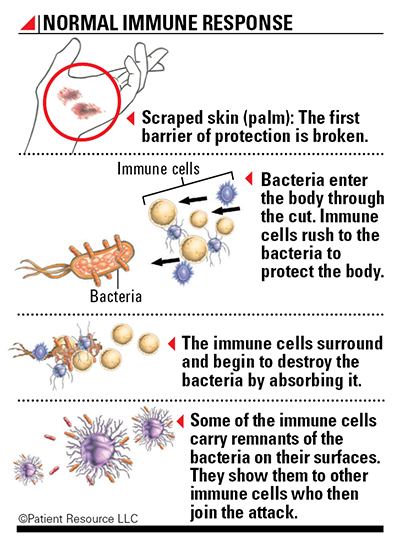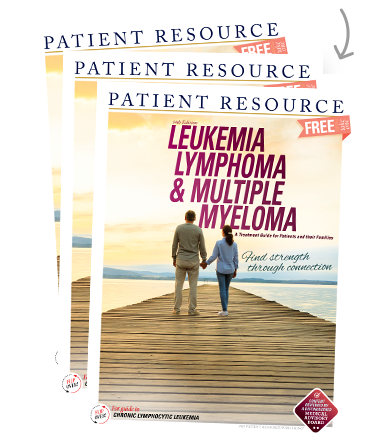Follicular Lymphoma
Types of Treatment
Multiple options are available to help treat follicular lymphoma. In general, follicular lymphoma responds well to treatment but is difficult to cure. Your doctor will develop a specific treatment plan for you based on several factors, including your overall health and the stage of your disease. Some of the most common options to treat follicular lymphoma are described here (see “Common Follicular Lymphoma Drugs” below).
| Common Follicular Lymphoma Drugs | |
| Chemotherapy | |
| bendamustine hydrochloride (Bendeka, Treanda) | |
| chlorambucil (Leukeran) | |
| cyclophosphamide | |
| doxorubicin (Adriamycin) | |
| lenalidomide (Revlimid) | |
| vincristine sulfate PFS | |
| Corticosteroid | |
| prednisone | |
| Immunotherapy | |
| ibritumomab tiuxetan (Zevalin) | |
| obinutuzumab (Gazyva) | |
| rituximab (Rituxan) | |
| Targeted Therapy | |
| idelalisib (Zydelig) | |
| Combination Therapies | |
| bendamustine (Bendeka, Treanda) combined with lenalidomide (Revlimid) | |
| BR: bendamustine (Bendeka, Treanda) combined with rituximab (Rituxan) | |
| R-CVP: rituximab (Rituxan) combined with cyclophosphamide, vincristine sulfate PFS and prednisone | |
| R-CHOP: rituximab (Rituxan) combined with cyclophosphamide, doxorubicin (Adriamycin), vincristine sulfate PFS and prednisone | |
| zanubrutinib (Brukinsa) with obinutuzumab (Gazyva) | |
Be aware that as research evolves and new treatments are discovered in studies known as clinical trials, additional treatments may become available (see Clinical Trials).
Watchful Waiting
Watchful waiting is an approach your doctor may take to closely monitor your follicular lymphoma. This approach is fairly common because follicular lymphoma develops slowly. Watchful waiting allows you to safely avoid treatment and its side effects until it is absolutely necessary. In some cases, you may never need active treatment; however, if the disease progresses beyond mildly swollen lymph nodes, your doctor may opt to start treatment with chemotherapy, immunotherapy, targeted therapy, radiation therapy or stem cell transplantation.
Chemotherapy
Chemotherapy is the use of drugs, also called cytotoxic drugs, to stop the growth of cancer cells either by killing them or preventing them from dividing and growing. Chemotherapy, a systemic therapy that travels throughout the body, is sometimes referred to as conventional chemotherapy to distinguish it from immunotherapy and targeted therapy, which also involve the use of drugs that travel throughout the body.
Chemotherapy is a treatment option for all stages of follicular lymphoma and is often the first treatment option used. A single chemotherapy drug may be used, or your doctor may prescribe a combination of chemotherapy drugs or a chemotherapy drug plus a monoclonal antibody.
Some chemotherapy drugs work by damaging the cancer cells’ DNA or by disrupting the making of DNA. Others disrupt the development of new cells. As a result, no new cells are made to replace dying cells. Many chemotherapy drugs are designed to work when cells are in the active growth phase, which includes cells that grow and divide. The drugs disrupt the growth phase. Other chemotherapy drugs work whether the cells are in a growth or resting phase.
Many chemotherapy drugs used to treat follicular lymphoma are liquids that are injected slowly into a vein. Some drugs are a pill that is swallowed. Both types of drugs travel in your bloodstream to treat cancer throughout your body.
Another drug that is sometimes included in many chemotherapy combination regimens is a corticosteroid. This type of drug is not a chemotherapy drug. It is an anti-inflammatory drug that also appears to help cause the death of cancerous white blood cells.
Combination chemotherapy regimens often are used to treat many types of cancer, including follicular lymphoma. The regimens used to treat follicular lymphoma include one or more chemotherapy drugs in combination with a monoclonal antibody or corticosteroid. (See “Common Follicular Lymphoma Drugs” above).
Treatment for Relapsed Disease
Unfortunately, it’s common for follicular lymphoma to come back after treatment. When this occurs, it is called relapsed disease. Relapse can happen weeks, months or even years after initial treatment has ended.
Relapsed follicular lymphoma may be treated with chemotherapy, immunotherapy, targeted therapy or some combination of these treatments. Radioimmunotherapy may also be used alone or in combination with chemotherapy. If at least two drugs have been used previously to treat follicular lymphoma, additional drug options are available.
For some people, high-dose chemotherapy and autologous stem cell transplantation may provide a prolonged, disease-free time period.
Follicular lymphoma sometimes transforms into diffuse large B-cell lymphoma, which is more aggressive. When this occurs, the treatment plan will change to treat this new disease.

Immunotherapy
Immunotherapy uses the body’s own immune system to slow the growth of and kill cancer cells. To do so, the immune system uses substances made either by the body or in a laboratory to find and destroy cancer cells, much like it fights off foreign bacteria (see Figure below). The main types of immunotherapies used to treat this particular cancer are monoclonal antibodies, which are laboratory-made versions of immune system proteins designed to attack cancer cells.
One type of monoclonal antibody that is commonly used to treat follicular lymphoma attaches to a specific protein found on B-cells, the cells from which follicular lymphoma arise. It makes the B-cells more visible to the immune system, which helps it attack them more efficiently.
A somewhat similar treatment option involves the use of a radioactive monoclonal antibody. An immunotherapy drug combines a radioactive particle with a monoclonal antibody, allowing it to deliver radiation directly to the cancer cells. This approach leaves most of the surrounding healthy cells undamaged.
Targeted Therapy
Researchers have learned about the cell pathways that can lead to many types of cancers, including follicular lymphoma, and also have learned how to develop drugs that block those pathways. These drugs are known as targeted drugs (or agents), and the treatment is known as targeted therapy. Targeted therapy drugs block the signals that proteins and other molecules send along signaling pathways, which are systems in the body that direct basic cell functions like growth, division and death. Effective targeted therapy depends on two factors: identifying targets that play an important role in the growth and survival of cancer cells, and developing agents that can attack those targets.
One concern associated with both chemotherapy and targeted therapy is that cancer cells can become resistant to the drugs, which may make them less effective over time. Researchers continue to explore ways to overcome resistance and identify new pathways to target and develop agents to interrupt the growth of follicular lymphoma cells.
Discussing Treatment Options - Questions to Ask Your Medical Team
- What is the goal of each of my treatment options?
- How do the benefits of the recommended cancer treatment compare with the risks?
- Are there any clinical trails open to me?
- Will I need to be hospitalized for the treatment, or can it be done in an outpatient clinic?
- What is the expected timeline of each treatment plan?
- How will each treatment affect my daily life?
- What are the possible side effects of each of my treatment options?
- How long will the side effects probably last?
- Is there a way to decrease the possibility that these side effects will occur?
- Are there medications available to relieve or prevent these side effects?
- How can I keep myself as healthy as possible during treatment?
Radiation Therapy
Radiation therapy is the use of high-energy X-rays to kill cancer cells or keep them from growing. External-beam radiation therapy is given with the use of a radiation machine and is similar to a conventional X-ray, except the radiation beams are strong enough to kill cancer cells.
Stage I and early Stage II follicular lymphoma may be treated with radiation therapy, which targets the lymph node areas affected by the cancer. In later stage lymphoma, radiation therapy may be used to reduce symptoms or to treat people who cannot tolerate chemotherapy.
If your doctor includes radiation therapy in your treatment plan, a radiation oncologist will carefully plan and oversee your treatment.
Stem Cell Transplantation
Stem cells are found in the bone marrow, and they have a special feature that enables them to develop into any one of the three types of blood cells — red blood cells, white blood cells (cells that fight infection) and platelets (clotting cells). There are two types of stem cell transplantation: autologous and allogeneic.
With autologous stem cell transplantation, a person’s own stem cells are removed and preserved so that very high doses of chemotherapy and/or radiation therapy can be given to attack cancer cells. After the conclusion of the intensive chemotherapy or radiation therapy, the person’s stem cells are infused back into the body.
Allogeneic stem cell transplantation is the use of stem cells obtained from a donor with healthy bone marrow whose stem cells are a close match to those of the person being treated. Allogeneic stem cell transplantation is considered to be a form of immunotherapy because it establishes a new immune system.
In cases of follicular lymphoma, stem cell transplantation is most commonly used when the cancer is in remission but likely to come back or when the cancer doesn’t respond to the initial treatment plan.
Dealing with Recurrence
Follicular lymphoma is typically a disease that has multiple relapses, which is referred to as recurrences. If your cancer is recurrent, your doctor will begin a new cycle of diagnostic tests to learn about the recurrence. These tests may include another tissue biopsy, laboratory tests and imaging studies. The doctor will confirm if the cancer is recurrent and will determine if it has transformed into a more aggressive subtype, which will affect your new treatment plan.
If your follicular lymphoma has officially returned, your doctor will discuss the best treatment options for you. Many of the options available for your first treatment also are available for treating recurrent follicular lymphoma. In determining your treatment plan options, the following factors will be considered:
- The type of cancer, where in the body it came back, and the size
- Your overall health
- The type of treatment you originally received and how well it worked
- Side effects you experienced with the original treatment
- How long it has been since you finished treatment
When a recurrence happens, it is possible for tumors and cancer cells to be resistant to chemotherapy. Typically, they respond less favorably to treatment than the first tumors did. However, new approaches to treatment may be available to you through clinical trials (see Clinical Trials).
Whether you choose to receive more cancer treatment or not, consider getting supportive or palliative care, which treats the symptoms of follicular lymphoma. These options are not expected to cure cancer or prolong life, but they focus on making your life the best it can be.



